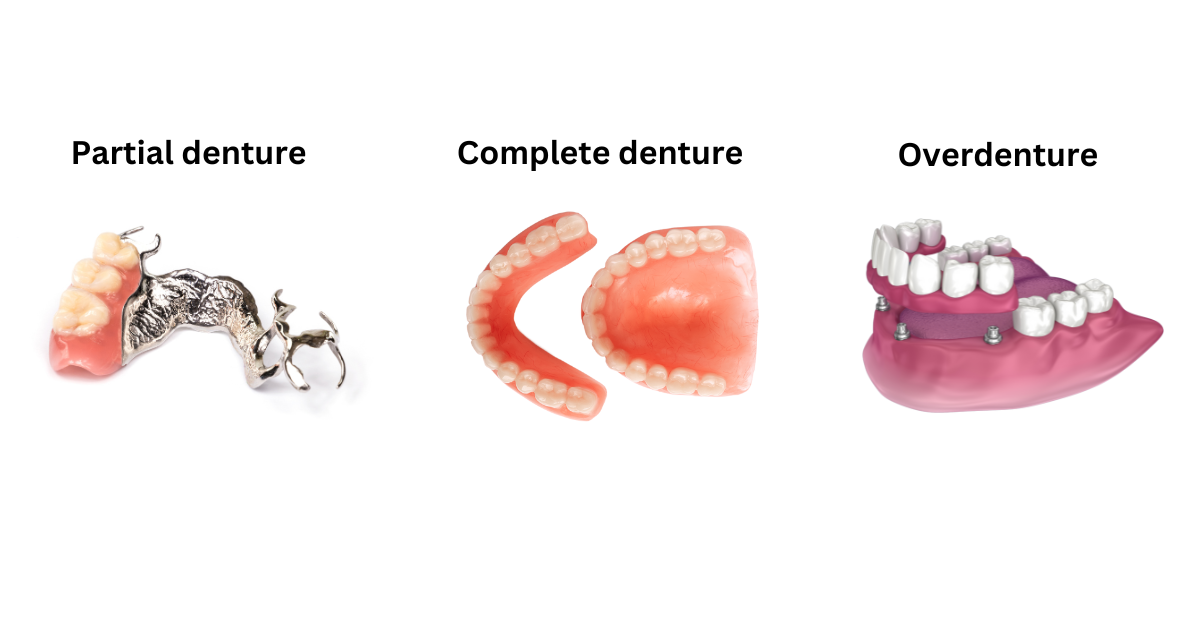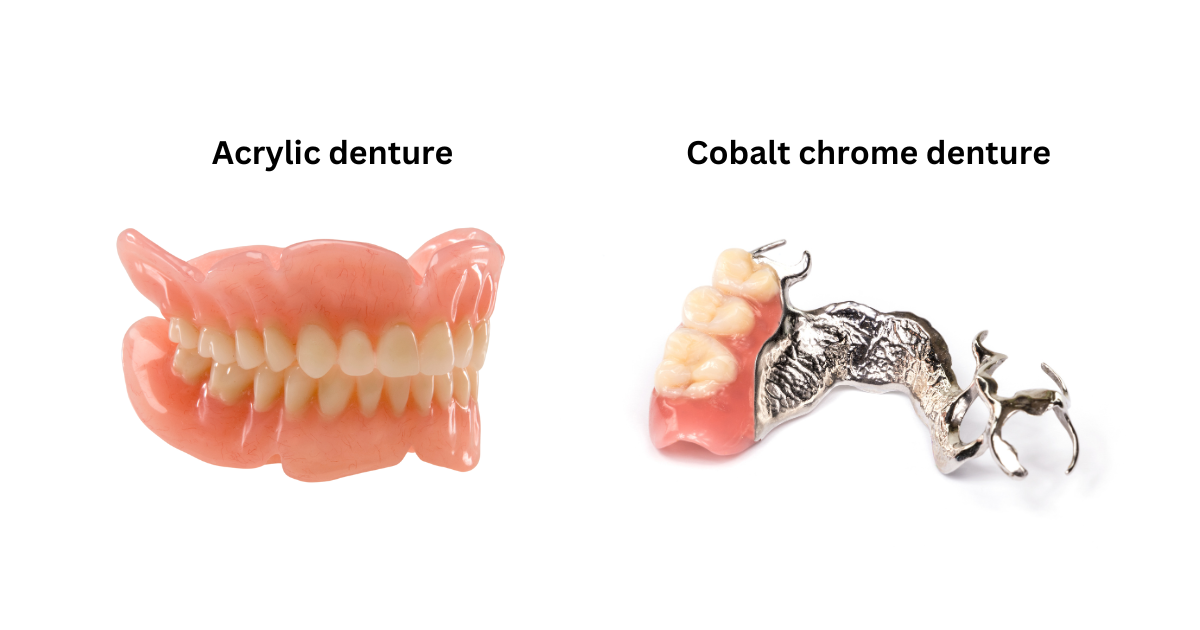What is a denture?
Dentures are removable appliances that replace missing teeth and surrounding tissues to help restore form, function, and also one’s aesthetics. They are custom-made to the individual's mouth and are used when a person has lost natural teeth due to various reasons, such as tooth decay, gum disease, or injury.
What are the types of dentures?
There are several types of dentures designed to cater to different dental needs. The main types include:
Partial denture
- Complete denture
Overdenture

Partial Denture
A partial denture is a prosthesis that replaces single or multiple missing teeth. It uses both tooth and tissue support to aid in retention.
Complete denture
A complete denture is a prosthesis that replaces all the natural teeth that have been lost within a jaw and are solely supported by the soft tissues in the mouth.
Overdenture
An overdenture is a type of removable denture that is designed to fit over remaining natural teeth or dental implants. Unlike a conventional denture, which rests directly on the gums, an overdenture provides additional support and stability through its connection to existing teeth or dental implants. Overdentures are often considered a more secure and functional option for individuals who have some remaining natural teeth or have chosen to undergo dental implant placement.
Types of materials for dentures
Dentures can be constructed using various materials, each offering distinct advantages. The primary materials for dentures include:
Acrylic denture
Cobalt chrome denture

Acrylic denture
Acrylic denture consists of replacement teeth that are set in pink or gum-coloured acrylic resin. This type of denture covers more tissue, is a little bit thicker than the cobalt chrome denture, and is easy to fracture.
Advantages:
- Easy to add teeth and make modifications
- More aesthetic than cobalt chrome
- Wets better and assists in retention
Disadvantages:
- Weaker material than cobalt chrome and fractures more easily
- Thicker and bulkier as it covers more tissue
- Warps easily and is a poor temperature conductor
- Picks up stains and accumulates plaque easily
Cobalt chrome denture
The framework in this type of partial denture is made from an alloy of cobalt and chromium; the false teeth will be attached to the framework with acrylic. They are thinner, much stronger than acrylic dentures, and lighter to wear; but have higher manufacturing costs.
Advantages:
- Is a stronger material, making it more resistant and ideal for patients with heavy wear
Less bulky and ideal for patients who have gagging issues as the material is thinner
- Does not pick up stains as easily
Disadvantages:
- Difficult to repair and add on teeth
- Not as aesthetically pleasing
- May tarnish and corrode
- Higher manufacturing costs
What are the benefits of dentures?
Chewing:
Dentures allow individuals to chew and eat a variety of foods. Missing teeth can make it difficult to bite and chew properly. Dentures provide a functional set of teeth, enabling individuals to eat a wider range of foods.
Speech:
Missing teeth can impact speech by affecting the way air flows through the oral cavity. Dentures help in restoring proper speech patterns, making it easier for individuals to articulate words and communicate effectively.
Aesthetics:
Dentures contribute to the cosmetic appearance of the face by filling in gaps left by missing teeth. They provide a natural-looking set of teeth, helping individuals feel more confident about their smile and overall appearance.
Support for facial muscles:
When teeth are missing, the facial muscles can sag and lose support. Dentures provide support to these muscles, helping to maintain the natural contours of the face and preventing a sunken appearance.
Improved self-esteem:
Dentures can have a positive impact on an individual's self-esteem and confidence by restoring their ability to smile, speak, and eat without hesitation. Feeling comfortable and confident with one's teeth can greatly enhance overall well-being.
How are dentures made?
You can go to a dental clinic to make a denture.
The denture construction process generally takes about 4-6 visits on average.
Primary impression:
During the first appointment, the dentist will examine the oral condition and take primary impressions. Primary impressions are imprints of your teeth to create dental casts for diagnostic purposes and to aid in designing the new denture.
Secondary impression:
The dentist will then make necessary preparations on the teeth according to the denture design. Using the dental cast from the first impression, a personalised impression tray will be fabricated to take a more accurate imprint of your teeth and the surrounding soft tissues. This step ensures optimal impression accuracy so that the resulting fit of the denture is as precise as possible.
Bite registration:
Bite registrations help to record how the upper and lower teeth meet in its natural biting position.
Try-in stage:
At this stage, a preliminary set of dentures is constructed made out of wax, they are meant to give you a chance to “try on” the new dentures and see what they will look like before processing the wax denture base into hard acrylic. You will “try in” this model and the denture will be assessed for colour, shape, and fit before the final denture is made. You will “try in” this model and the denture will be assessed for its overall functionality (your ability to chew, and pronounce words) as well as its aesthetic appearance in the mouth.
Issue stage:
The finished denture is inserted in the mouth and necessary adjustments will be made until the patient feels comfortable wearing the new denture.
Review stage:
This appointment is to ensure that the oral tissues are not being damaged and that the dentures are functional.
Tips for new denture wearers
- During the initial days of adapting to dentures, it's advisable to stick to a soft food diet. Opt for smaller, bite-sized portions to make chewing more manageable.
- Additionally, reading aloud in the initial days can aid in overcoming speech difficulties, as your tongue and mouth muscles gradually adjust to the presence of dentures.
- Consider using denture adhesives during this adjustment period to enhance stability and comfort. These measures collectively contribute to a smoother transition to wearing and adapting to your new dentures.
- If you experience pain, refrain from using the denture temporarily and visit your dentist as soon as possible.
How to care for your dentures?
Clean your dentures daily
Rinse your dentures after every meal to remove loose food particles.
Use a soft-bristle toothbrush or a denture brush to clean your dentures daily. Avoid using a regular toothbrush, as it can be too abrasive and damage the denture material.
Use a mild soap or denture cleaner recommended by your dentist. Do not use regular toothpaste, as it can be too abrasive.
Avoid wearing your denture overnight
Remove your dentures before going to bed to allow your gums to rest.
Soak your dentures overnight in a denture-cleaning solution or water. This helps prevent them from drying out and losing their shape.
Handle with care
Handle your dentures with care to avoid dropping them.
When handling them, place a towel or a basin of water in the sink to reduce the risk of breakage in case they are accidentally dropped.
Avoid hot water
Avoid using hot or boiling water to clean or soak your dentures, as it may lead to warping. Use lukewarm water instead.
Oral hygiene for natural teeth
If you have partial dentures and still have some natural teeth, continue to brush and floss your natural teeth as instructed by your dentist.
Inspect for damage
Regularly inspect your dentures for any signs of damage, such as cracks, chips, or broken clasps. If you notice any issues, consult your dentist for repairs.
Avoid abrasive cleaners
Avoid using abrasive cleaners or harsh chemicals on your dentures, as they can damage the material. Stick to products recommended by your dentist.
Be mindful of diet
Be cautious with your diet. Avoid hard or sticky foods that could damage or dislodge your dentures. Cut food into smaller pieces to make chewing easier.
Proper storage
When you're not wearing your dentures, store them in water or a denture-cleaning solution. Avoid letting them dry out, as this can lead to changes in their shape.
FAQ
Do I need to remove dentures at night?
Yes, you need to remove dentures at night to allow your gums to rest. Leaving the dentures in your mouth can affect one’s saliva flow and result in a fungal infection called denture stomatitis.
Can I eat normally with dentures?
Yes, you can. Once you get used to your dentures, you can eat a variety of foods with confidence. However, it is advisable to avoid hard foods for optimal denture care.
How long does it take to get used to dentures?
Typically, it takes a few weeks to adjust to new dentures, though the duration may vary from person to person.
Who is suitable for dentures?
In general, any individual with missing teeth can wear dentures. However, since each case is unique, a thorough evaluation by a dentist is essential to determine the most suitable course of action.
How long do dentures last?
With proper care and maintenance, dentures can last for many years. Regular dental check-ups and good oral hygiene are essential for long-term success.
For more information, contact us:
Thomson Dental Centre
Call: 6255 0770
WhatsApp: 8716 9594
Book an AppointmentDr Charlotte Goh
Dentistry
Thomson Dental Centre (Novena Specialist Center)
English
AIA Dental PPO, Alliance MediNet, IHP, Inova Care and 2 others

